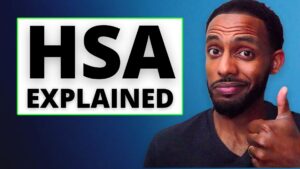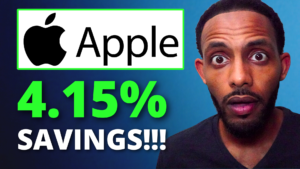TRANSCRIPT
There are some important factors to consider when signing for a high yield savings account that I wish I knew when we signed up for our first one several years ago. Today I’m going over what you should know about high yield savings accounts that often gets overlooked…like taxes and that’s where we’ll begin!
Whether or not you make withdrawals from your HYSA doesn’t change your tax responsibility. Any interest earned on your high yield savings account is still considered taxable income, unless you are exempt.
Some of the reasons you may be exempt:
- Corporations
- Tax-exempt organizations
There’s more which you can see on the screen if you’re watching on YouTube, but generally for everyday people like you and me we are not going to be exempt from taxes, which means you gotta understand your tax responsibilities when it comes to earning interest in a high yield savings account. So letting the money stay in your high yield savings account doesn’t mean you don’t have to pay taxes on the interest earned. If you file taxes then you need to report the interest you earned for that year you’re filing.
Now this brings me to my next point. Figuring out how much you need to put away for taxes. And well it’s actually not that difficult. I’ll tell you what we do. First, you should have a general idea of what tax bracket you’re in and if you don’t know then you can look at your previous year’s tax return. That is the percentage that I would put away for taxes.
For example, let’s say you earned $1,000 in interest and you’re in the 32% tax bracket for a married couple filing jointly. So, take 32% of $1,000 and you have $320 that I would suggest you put away for taxes, especially if you’re unsure if you will owe taxes or be owed taxes from the government. If you’re in the 24% tax bracket then you simply take 24% of $1,000 which is $240 for taxes and that’s what your potential tax liability of the interest you earned in that high yield savings would be.
Since we’re in a country with a progressive tax system, the interest earned would just count as ordinary income and get taxed at whatever tax bracket you find yourself in. And here’s something else, if you were to make enough interest, that could actually push you into the next highest bracket which means you would end up paying more in taxes.
And an argument can be made on how unfair it is for every day people to get taxed on this interest that you decided to save and put away and the government benefiting from that, but that’s a topic for another day. At the end of the day I am earning interest that I wasn’t before and this high yield savings account is really just for emergency purposes so personally I’m not too worried about the taxes that I could be responsible for. I will just make sure to put whatever percentage away based on my tax bracket.
There have been a lot of headlines around the Fed and what they plan to do with the federal funds rate? If that comes down how will it affect what happens to the interest on your HYSA. And next I want you to know that the interest or yield you earn in a high yield savings account will go down aaaaaand up…typically based on whatever the federal funds rate does. It’s not a direct cause and effect relationship between your high yield savings account interest rate and the federal funds rate, but because banks and financial institutions are affected by the federal funds rate that in turn affects what kind of yield they are able to offer to their customers.
Now I know you see all these bonus offers and the high yields being offered at a new bank each month. But before you start applying for every HYSA out there you should know all that activity gets reported to Chexsystems. Think of ChexSystems as the Experian or Equifax of checking and savings accounts, EXCEPT all that really gets reported is negative information about you and your history with checking and savings accounts so overdraft fees will show up , and how many checking and savings accounts you’ve tried to open in the last three years so it’s important to recognize that you really don’t want to be opening 10, 12, 15 different savings accounts, otherwise you run the risk of not being eligible to have a savings account in the future that is offering some good perks. Now as you’re checking your status within check systems you may notice something that is an accurate and that is your opportunity to try to correct any errors that you see in check system about you and your banking history.
I’m still a fan of using high yield savings accounts mainly as an emergency fund placeholder. 3-6 months or if you want to go higher 9-12 months. If that number for you is anywhere from $30k to $100k or more you could easily see monthly deposits of $100-$400 month with current yields that we’re seeing which is not bad.
I will say that if you find yourself struggling to even save $1,000 then you will want to check out the video on the screen or below where I discuss 7 money habits you need to avoid that could keep you broke, click on it and I’ll see you over there. Peace!
WATCH NEXT ➡️ 7 Money Habits Keeping You Poor (AVOID These Wealth Killers!) https://youtu.be/StAkdqbqCoc


